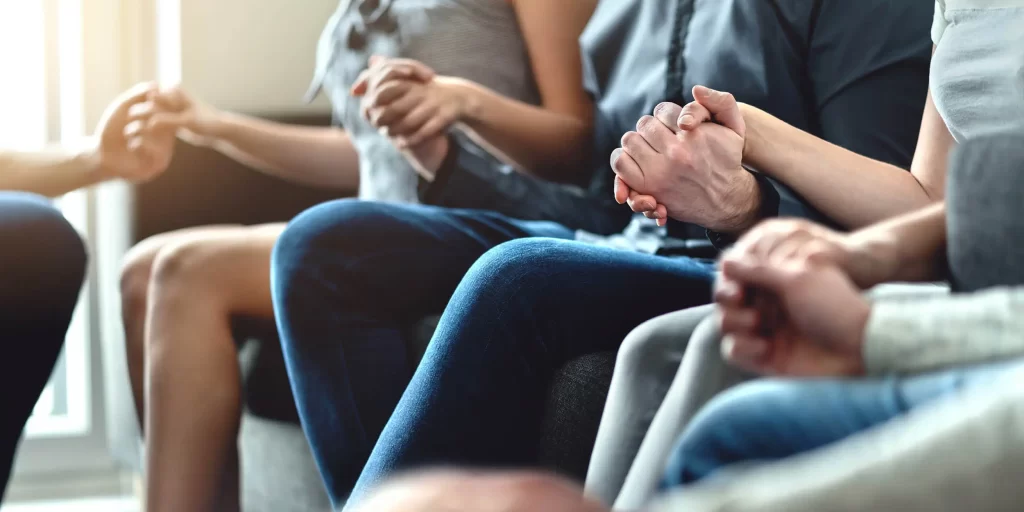Peer Recovery Support Groups
Written by Megan Hull
& Medically Reviewed by Jenni Jacobsen, LSW
Medically Reviewed
Up to Date
Last Updated - 6/17/2022
View our editorial policy
The Substance Abuse and Mental Health Services Administration (SAMHSA) recognizes peer support as one of the ten critical components of recovery. Peer support is, therefore, becoming a popular component of the addiction treatment process.
The Role of Peer Recovery Specialists in Addiction Recovery
A peer recovery support specialist is someone who has achieved success in addiction recovery and provides assistance to others who are undergoing treatment. The role of a peer recovery coach is to encourage abstinence, keep people engaged in recovery and help them to avoid relapse. In addition, a peer recovery specialist can provide support outside of a clinical setting so that treatment extends into the client’s community environment.
Types of Peer Support Offered
Peer recovery coaches offer various types of peer support. Peer support specialists can provide direct support to people in recovery. For instance, they might lead group therapy sessions. They can also provide support more indirectly, such as by supervising or mentoring other peer support coaches.
Peer support coaches may provide support in the following forms:
- Emotional: Emotional support involves talking with people in treatment about the ups and downs of recovery and discussing stressors and coping techniques.
- Informational: A peer support coach who provides informational support might discuss risk factors of relapse or provide information about available resources within the community. Informational support can also involve discussing facts about addiction and recovery.
- Instrumental: With instrumental support, a peer support specialist might teach a person in recovery how to use skills such as mindfulness meditation or how to access a service within the community.
- Affiliation: A peer support specialist offers a form of affiliation support, as they help people in recovery feel like they are part of a social group.
Benefits of Peer Support
Research on peer support and peer support groups shows that programs involving peer support are more effective for reducing drug and alcohol use and preventing relapse. Peer support specialists appear to be able to fulfill their role of helping people in treatment remain abstinent from drugs. Research also shows that people who participate in peer support groups may be more likely to attend appointments and complete their treatment program.
There are several additional benefits associated with peer support, including:
- Reduction in drug cravings
- A decrease in negative emotions
- Increased confidence in sobriety
- Reduced shame and guilt
- Improved quality of life
Why Peer Support Recovery Works
Peer support recovery outcomes demonstrate that there are numerous benefits associated with these types of programs. The reason these programs work is that they make people in recovery feel that they have social support. When people who are undergoing addiction treatment perceive that they have support, they realize there are other people undergoing the same struggles, which can help them achieve treatment goals.
In addition, peer support recovery can increase a person’s feelings of self-efficacy, meaning they believe they are capable of achieving their goals. When people feel they can be successful in recovery, they are more likely to engage in treatment and remain sober.
If you or a loved one is living with addiction and may benefit from peer support recovery services, The Recovery Village Ridgefield has a team of caring staff who can provide you with additional information. Reach out to an admissions specialist today to learn more.
Sources
Ostrow, Laysha, and Adams, Neal. “Recovery in the USA: From politics to peer support.” International Review of Psychiatry, February 2012. Accessed July 27, 2019.
Substance Abuse and Mental Health Services Administration. “Peers.” July 19, 2019. Accessed July 27, 2019.
Tracy, Kathlene, and Wallace, Samantha. “Benefits of peer support groups in the treatment of addiction.” Substance Abuse and Rehabilitation, September 29, 2016. Accessed July 27, 2019.
View Sources
Ostrow, Laysha, and Adams, Neal. “Recovery in the USA: From politics to peer support.” International Review of Psychiatry, February 2012. Accessed July 27, 2019.
Substance Abuse and Mental Health Services Administration. “Peers.” July 19, 2019. Accessed July 27, 2019.
Tracy, Kathlene, and Wallace, Samantha. “Benefits of peer support groups in the treatment of addiction.” Substance Abuse and Rehabilitation, September 29, 2016. Accessed July 27, 2019.
Authorship






